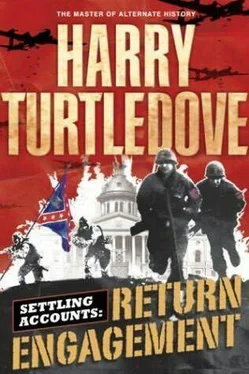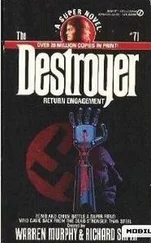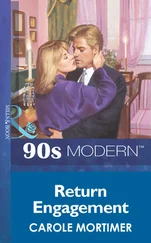Harry Turtledove - Return engagement
Здесь есть возможность читать онлайн «Harry Turtledove - Return engagement» весь текст электронной книги совершенно бесплатно (целиком полную версию без сокращений). В некоторых случаях можно слушать аудио, скачать через торрент в формате fb2 и присутствует краткое содержание. Жанр: История, на английском языке. Описание произведения, (предисловие) а так же отзывы посетителей доступны на портале библиотеки ЛибКат.
- Название:Return engagement
- Автор:
- Жанр:
- Год:неизвестен
- ISBN:нет данных
- Рейтинг книги:5 / 5. Голосов: 1
-
Избранное:Добавить в избранное
- Отзывы:
-
Ваша оценка:
- 100
- 1
- 2
- 3
- 4
- 5
Return engagement: краткое содержание, описание и аннотация
Предлагаем к чтению аннотацию, описание, краткое содержание или предисловие (зависит от того, что написал сам автор книги «Return engagement»). Если вы не нашли необходимую информацию о книге — напишите в комментариях, мы постараемся отыскать её.
Return engagement — читать онлайн бесплатно полную книгу (весь текст) целиком
Ниже представлен текст книги, разбитый по страницам. Система сохранения места последней прочитанной страницы, позволяет с удобством читать онлайн бесплатно книгу «Return engagement», без необходимости каждый раз заново искать на чём Вы остановились. Поставьте закладку, и сможете в любой момент перейти на страницу, на которой закончили чтение.
Интервал:
Закладка:
Four or five scared recruits stopped screaming and laughed. Somewhere up the trench, Eddie McCloskey gave his detailed opinion about what Armstrong could do with and to his socks.
Then a bomb burst in the trench, less than a hundred feet away. The earthwork zigzagged, so the blast didn't travel far. What the bomb did do was bad enough anyway. Something thumped Armstrong in the shoulder. He automatically reached out to see what it was, and found himself holding a little less than half of somebody's hand.
Blood splashed and streaked his palm. With a cry of disgust, he threw away the ruined part of a man. But shrieks from close by where the bomb had hit sent him moving in that direction. (Only silence came from the very place where the bomb had landed. Nothing right there lived to shriek.)
He stumbled over a man's head. It moved when his foot hit it-moved like a kicked football, moved in a way that proved it was no longer attached to a body. He gasped out a couple of horrified curses. He'd made a joke about Eddie McCloskey's socks when he didn't know how bad things could be. Now he was finding out, and whatever jokes might have lived within him withered.
It was still nighttime. He couldn't see very well. But he knew the bloody smell of a butcher's shop. He knew it, and he'd never expected to find it here, especially not mingled with the darker outhouse reeks of offal.
Along with the young men who were dead were several who wished they were. They shouted loudly for someone to kill them. Armstrong would have done it, too, if only to make them shut up, had he had any kind of weapon. Since he didn't, he had to try to keep them alive instead.
That was hardly easier than putting them out of their misery. He had no bandages, no medicines, no nothing. He found one fellow clutching a gaping wound in his calf. He tore the laces out of the injured soldier's shoes and used them for a tourniquet. He never knew for sure if that did any good, for he went on to someone else right away, but he dared hope.
Somebody let out a whoop of savage glee, shouting, "We got one of the sons of bitches, anyhow!" And so they had. A C.S. bomber overhead trailed fire from one engine. The flames slid up the wing toward the fuselage.
"I hope all the cocksuckers in there roast," Armstrong snarled.
Several other men nodded or wished something even worse on the Confederate fliers. "Shitheads didn't even declare war on us," someone said.
"Well, what do you think?" another soldier asked. "You think we're at war with them now-or shall we invite 'em in for tea?"
Armstrong kept hoping this was a nightmare from which he'd wake up. The hope kept getting dashed, again and again and again. The bombers didn't linger overhead very long-they must have had other targets besides Fort Custer. It only seemed like forever, or ten minutes longer. As the bombs started falling somewhere else, Armstrong came out of the trench and looked around.
Nothing was left of the barracks except burning rubble. Several other buildings were also on fire. So were autos and trucks. Bomb craters made the paths and lawns resemble what people with high foreheads said the surface of the moon was like. Armstrong didn't know much about that. He did know it was the biggest, most godawful mess he'd ever seen in his life. His mother and his granny had gone on and on about what Washington, D.C.-his home town-was like during the Great War. He hadn't taken them too seriously. He didn't remember such things, after all. But now, with a convert's sudden zeal, he believed.
"Who the hell is that?" One of the other men pointed at somebody walking in out of the predawn darkness.
The newcomer wore coveralls of an unfamiliar cut. Even by the light of blazing buildings and vehicles, Armstrong could see the coveralls were the wrong color, too. The stranger had a pistol on his hip, but he didn't try to use it. Instead, he raised his hands above his head. "Reckon y'all got me," he drawled, sounding cheerful enough. "Isn't much point for a flyin' man to go on with the fight once his airplane goes down, now is there?"
Just hearing that Southern accent made Armstrong wish he had a gun handy. The bastard thought he could murder U.S. soldiers and then bail out of the war as easily as he'd bailed out of the bomber? Growling like an angry dog, Armstrong took a couple of steps toward him.
A rock sailed out of the darkness and caught the Confederate airman above the ear. In the firelight, he looked absurdly surprised. As he started to crumple, he tried to get the pistol out of the holster. He couldn't. His hands didn't seem to remember what they were supposed to do.
And it probably wouldn't have made any difference anyway. Armstrong and eight or ten others rushed him. He wouldn't have been able to hold on to the gun for more than a heartbeat. He might have shot one of the U.S. soldiers, or two, but after that… After that, he would have been a dead man. Which he was anyway.
By the time the soldiers finished pounding and kicking and stomping, he didn't look anything like a man any more. He resembled nothing so much as a large broken doll lying there on the grass, all of its limbs bent in directions impossible in nature. His neck had an unnatural twist in it, too.
A corporal came up right after the recruits realized the flier had no more sport left in him. "Jesus Christ, you bastards, what the hell did you go and do?"
"Gave this asshole what he deserved," Armstrong answered. Morning twilight was beginning to paint the eastern sky with gray.
"Well, yeah." The noncom stared at the crumpled corpse. "But do you know how much of a stink there'll be if the Confederates find out what the hell you did? They're liable to start doing the same thing to our guys, too."
Armstrong hadn't thought of that. It was the only reason he could imagine for regretting what he'd just helped do. He would have rid the world of ten or a hundred Confederates as cheerfully, if only he'd got his hands on them.
One of the other men who'd mobbed the flier said, "Hell with it, Corporal. We'll throw the motherfucker in the trench where the bomb hit, toss his clothes on the fire, and bury the pistol somewhere. After that, who's gonna know?"
After a little thought, the soldier with two stripes on his sleeve nodded. "All right. That's about the best we can do now, I guess. Get the identity disk off from around his neck, too, and bury it with the piece. That way, people will think he was one of ours when they deal with the bodies." He came closer and took a long look at the dead Confederate. "Fuck! Nobody'll recognize him, that's for sure."
"It's a war, Corporal," Armstrong said. "You wanted us to give him a big kiss when he came in here with that shit-eating grin on his face? We kissed him, all right. We kissed him good-bye." The noncom waved for him and the others to take care of the body. They did. The corporal didn't do any of the work himself. That was what having those stripes on his sleeve meant.
Brigadier General Clarence Potter had spent three years up near the front in the Great War. He hadn't had to do a lot of actual fighting; he'd been in Intelligence with the Army of Northern Virginia. He was in Intelligence still-or rather, after close to twenty years out of the Confederate Army, in Intelligence again-but wished he could get up to the front once more instead of being stuck in Richmond.
A tall, well-made man in his mid-fifties, Potter had close-cropped hair now closer to white than to its original dark brown. His cold gray eyes surveyed the world from behind steel-rimmed spectacles. The spectacles, these days, were bifocals. That had annoyed him when he first got them. By now, he was used to them and took them for granted.
A telephone on his desk rang. "Potter speaking," he said briskly. His accent was clipped and Yankeelike. He'd gone to college at Yale, and the way of speaking up there had stuck. That made some of his fellow Confederates look at him suspiciously. It also made him and those like him valuable in intelligence work. The CSA and USA spoke the same language, with minor differences in accent and vocabulary. A man from the Confederate States who could sound as if he came from the United States made a valuable spy.
Читать дальшеИнтервал:
Закладка:
Похожие книги на «Return engagement»
Представляем Вашему вниманию похожие книги на «Return engagement» списком для выбора. Мы отобрали схожую по названию и смыслу литературу в надежде предоставить читателям больше вариантов отыскать новые, интересные, ещё непрочитанные произведения.
Обсуждение, отзывы о книге «Return engagement» и просто собственные мнения читателей. Оставьте ваши комментарии, напишите, что Вы думаете о произведении, его смысле или главных героях. Укажите что конкретно понравилось, а что нет, и почему Вы так считаете.












